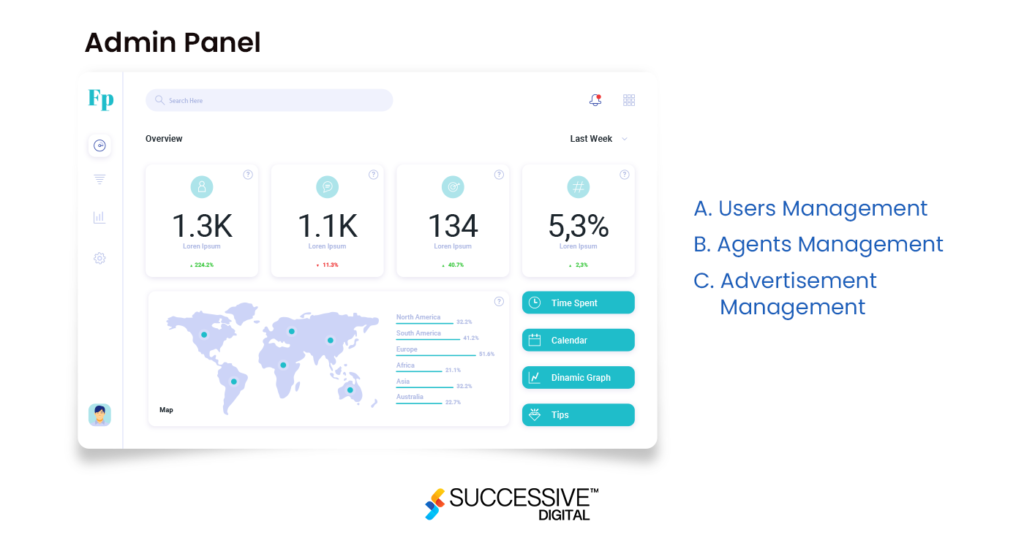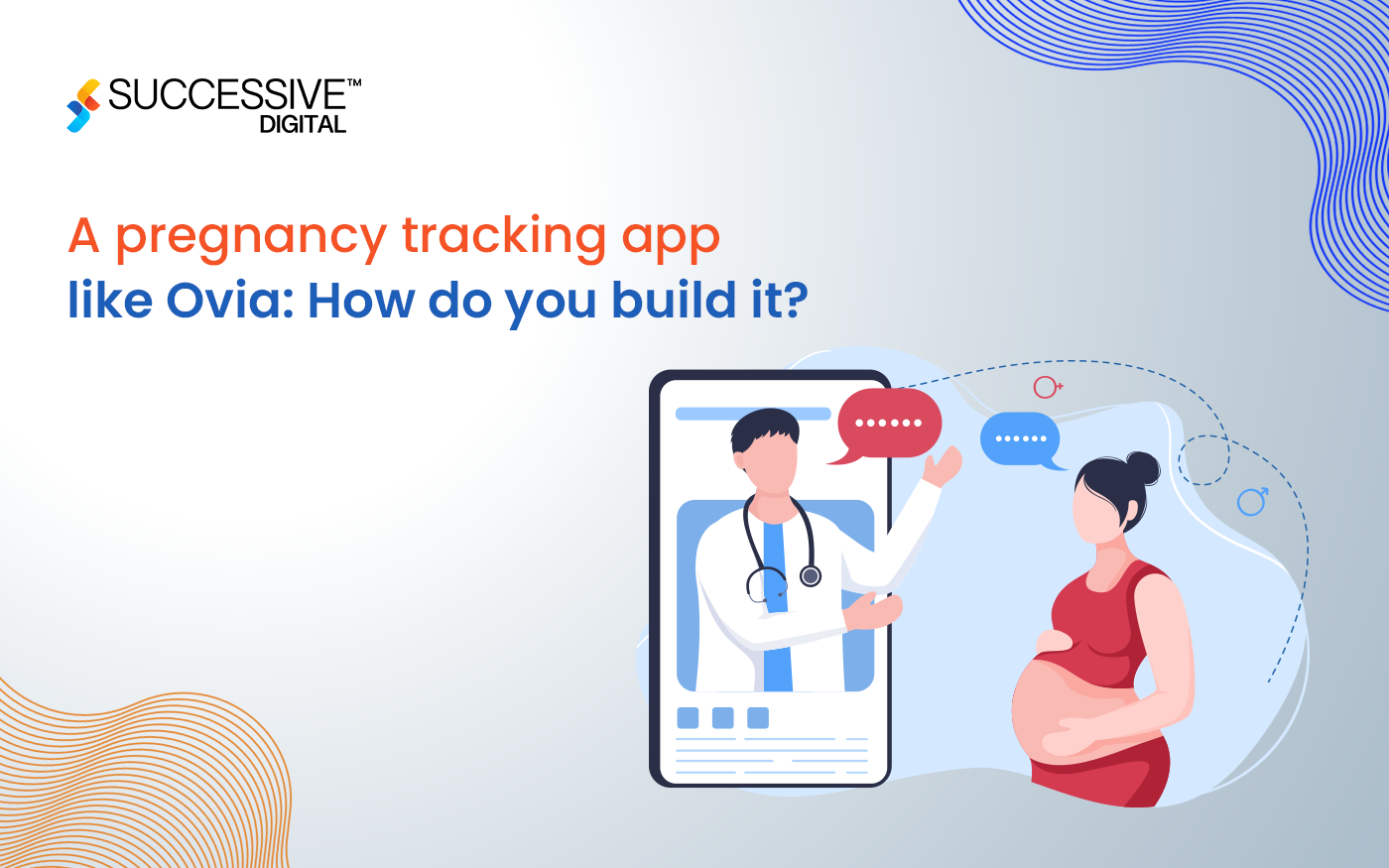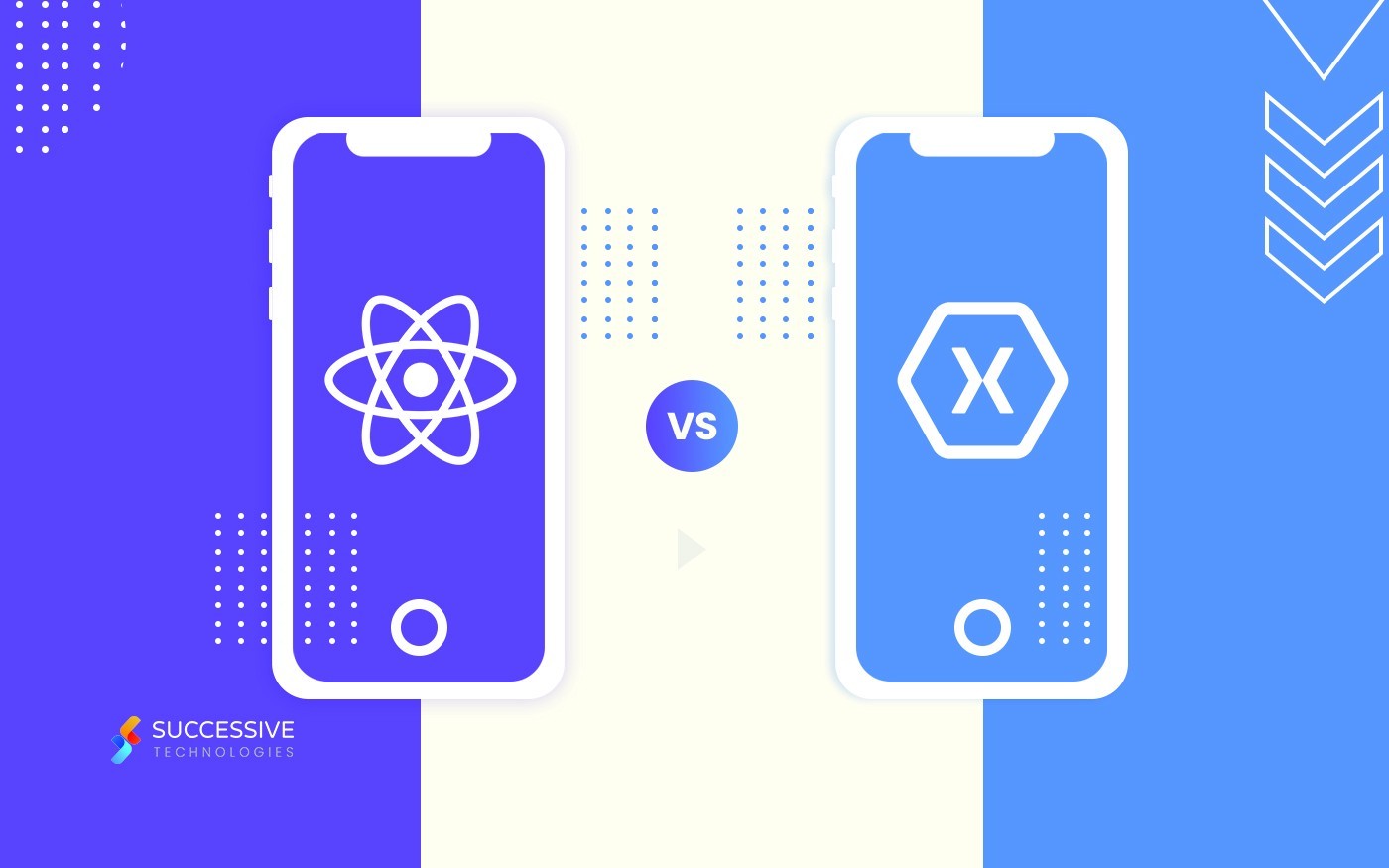When a traveler plans a trip to their dream destinations, they go beyond the curve and scan the internet to make it worthwhile. This has compelled several travel and hospitality businesses, like Expedia, Booking.com, and Trivago, to invest in travel app development, facilitate digital bookings, and build a solution that caters to travelers’ specific needs. According to a Statista report, Booking.com recorded 80 million app downloads, while Airbnb had 52 million app downloads in the list of most downloaded travel apps worldwide. This study clearly explains how travel apps can be a valuable investment for online travel agencies and startups looking to tap into the tourism industry.
This comprehensive guide will dive into the details of travel app development, its benefits, development steps, essential features, and lastly, the cost.
How Mobile Apps are Transforming the Travel Industry?
Digital transformation in the tourism industry didn’t happen overnight. Travel agencies have implemented several strategies to make their business flourish, and being present digitally and facilitating an end-to-end digital experience is one of them.
Minimizing traditional hospitality operations, mobile apps have emerged as a significant player in transforming the tourism industry. It allows travel and hospitality operators to streamline their target users’ experiences – they provide travelers with accessibility to various options available throughout accommodations, flights, transportation, etc., of a specific destination via a single application and offer them the flexibility to book the best deal without having to leave the app or their homes, for that matter.
Furthermore, travel agencies also leverage the latest technologies, such as advanced AI and machine learning, for their mobile apps to gather data about customers’ preferences and leverage predictive analysis to improve their business strategies. An application-based customer experience journey gives agencies enough data to process and build models to make personalized travel recommendations based on the user’s past behavior and compel them to make the booking.
Benefits of Having a Travel App for Your Business
By now, you must’ve understood how the tourism industry is flourishing and is set to grow rapidly in the coming years. But with a spike in the industry’s CAGR comes an obligation to meet ever-evolving target users’ needs. Investing in tourism app development can give you a range of benefits to power your travel and hospitality business. Let’s discuss them below.
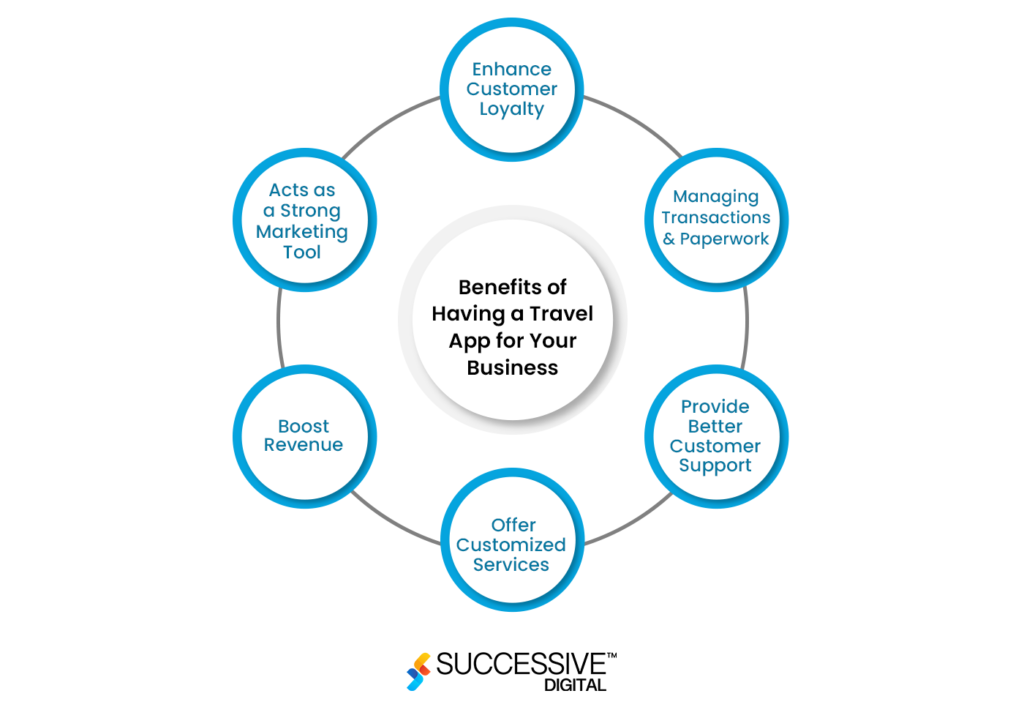
1. Enhance Customer Loyalty
With several businesses in competition, retaining loyal customers has become daunting in the long run. Here, the ideal solution is to invest in travel and tourism app development and build a target user-centric app. Creating a tailor-made mobile app allows you to reach a broader audience and meet their specific needs promptly to improve customer loyalty.
2. Minimizing Paperwork and Managing Transactions
A travel app enables travelers to book accommodations from the comfort of their homes, where they receive complete booking details in the app itself and over other platforms integrated with the app, such as Gmail and WhatsApp. This enables easy accessibility of all the documents upon arrival without carrying paper-based documents. Mobile apps also help businesses manage transactions for multiple users simultaneously. It enables them to eliminate the hassle of maintaining essentials like IDs and booking details on paper by making all the necessary traveler data manageable and accessible from a single app. With faster accessibility of traveler’s details, they can expedite the check-in and check-out process and facilitate in-app payments to enhance their travel booking experience.
3. Provide Better Customer Support
Every business aims to provide better customer services, irrespective of any industry. Since the travel industry is all about providing the “best possible” tour-related offerings, a mobile app can help boost the efficiency of these services and enable businesses to address customer queries faster. A high-performing travel app often includes functionalities such as in-app calling, AI-enabled chatbots, AR-enabled room or property tours, and WhatsApp-powered customer services, such as hotel ticket PDF and booking confirmation, that allow travel operators to provide advanced customer support.
4. Offer Customized Services
A travel app is designed to offer customized services to the end users. With its help, you can get detailed information about travelers’ preferences and cater your services, such as arrangements in the hotel room and meal options, for a better experience. You can leverage the latest technologies, such as AI, to offer personalized travel recommendations based on the past search preferences and booking behavior of the traveler and IoT for enabling Alexa-enabled hotel rooms that can play music, dim lighting, and order food with voice commands to enhance your hospitality services and overall traveler’s experience.
5. Boost Revenue
The traditional travel operations hampered businesses from reaching target customers since offline marketing strategies targeted every customer, irrespective of their needs. But thanks to mobile and web travel apps, online travel agencies can now reach the right customer, offer personalized experiences, and address their travel-related pain points. This enables them to persuade the target users for the final transaction and boost their sales.
6. Acts as a Strong Marketing Tool
The tourism app will be a significant marketing tool for your business. You can leverage it to showcase your services and essential insights to the target users and create brand awareness. Through a travel mobile app, you can also release notifications about sales, deals, offers, or discounts to the user via notifications who have been looking for or have opted in for future discounts. It will also help you to track and engage the users quickly to the offers and reduce marketing efforts while increasing sales. The more enticing your app is in front of the users, the higher the chances of it becoming successful in the market.
How Many Types of Travel Apps Can Be Developed?
Plenty of travel applications are rising up in the market, and tourism and hospitality businesses are increasing the experiences and expectations of travelers. Here is a list of different types of travel apps you can invest in to fill the gap in customer engagement and experience for your hospitality business.
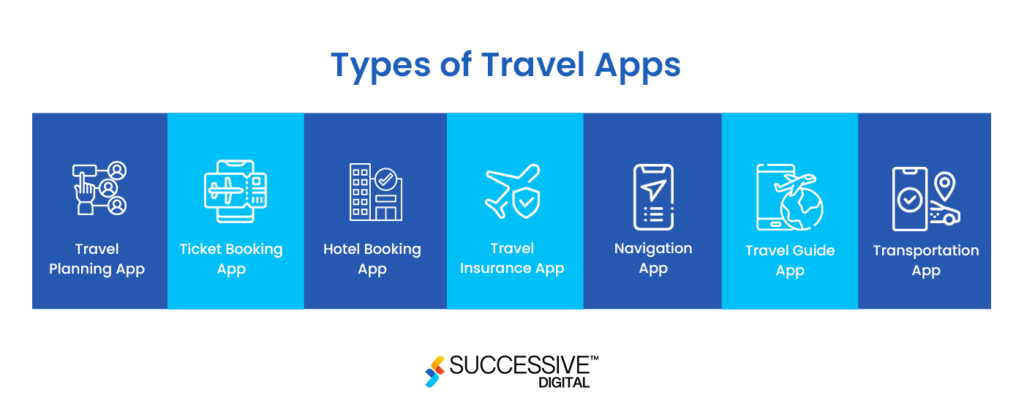 1. Travel Itinerary Planning Apps
1. Travel Itinerary Planning Apps
A travel itinerary planning app allows users to plan the overall itineraries of their trip. Adding functionality like this to your online travel business offerings enables you to capture travelers’ attention as you simplify their travel planning experience and save time often spent planning a comprehensive trip to multiple destinations at a time.
With travel planning applications, users can add all the details of their trip, including flight tickets, hotel booking, and other expenses, and manage everything from a single app. The app will manage their entire schedule and ensure they stay on track.
Some examples of these apps are Wanderlog, TripIt, and Sygic Travel.
2. Ticket Booking Apps
The ticket booking app development helps businesses build a dedicated app for travelers to book flight/train tickets for a particular destination. Such applications allow users to check and compare multiple flight/ train availability for preferred dates and display the best available options after scanning all third-party sites. With a ticket booking app, you can enable travelers to send push notifications for their preferred dates when the prices get low and help them with complete route planning by providing tickets for flights, trains, and buses. Additionally, your app must offer several deals and discounts, such as promo codes and “first booking” discounts, to help travelers book the best deals.
Examples of these apps include Expedia, Kayak, and Skyscanner.
3. Hotel Booking App
With the accommodation booking app, you can provide travelers with access to the details of various properties in a particular location or area. In such mobile applications, the users can check and compare the price range and other facilities, such as room type, pictures of the rooms, breakfast availability, check-in and check-out dates, and balcony views, and opt for the best hotel deal.
Such apps are Booking.com, Hotels.com, and Agoda.com.
4. Navigation Apps
By building a navigation app, you can help travelers find the perfect route from the airport/station to the required destinations in a particular city. A navigation app offers functionalities such as counting distance from the current location to the destination, displaying traffic, and integrating contact synchronization to track the latest check-ins of the user’s contacts. Additionally, it will show the best navigational route for reaching the hotel from the airport within the shortest time possible while minimizing traffic congestion.
Examples of such tourism apps include Google Maps, Apple Maps, and Komoot.
5. Travel Insurance Apps
Having travel insurance when planning a trip is a must-have for every traveler. The travel insurance apps provide insurance for travel-related accidents, such as baggage loss, theft, trip cancellation, loss of passport, medical emergency, bounced airline or hotel booking, etc., which are very common during long-haul trips. Hence, hospitality businesses can invest in such apps to help travelers book insurance coverage and track their past travel insurance and the latest ones for their upcoming trips.
Such apps are Goose Travel Insurance, Allianz TravelSmart, and AIG Travel Assistance.
6. Travel Guide Apps
By developing a travel guide app, you can assist travelers with information regarding events, heritage places, and restaurants of a particular destination. The app will include information about the best guides, restaurants, transportation, and tourist spots in the city. It will help travelers with functionalities like choosing the best restaurant to eat at or booking the top-rated tour guide, enhancing their overall trip experience.
Some popular travel guide apps are GetYourGuide, TripAdvisor, and Viator.
7. Transportation Apps
When travelers visit a new city, they prefer an on-the-go mobile app to book a cab and reach a particular spot quickly. By developing a transportation app, you can provide your target users with on-demand cab, bus, and taxi booking services. The app will provide functionalities, such as real-time ride tracking, driver details (driver name and vehicle’s RC number), and ride history, and help travelers reach their destination faster and without a hustle.
Examples of these apps include Uber, Ola, and Lyft.
Ready to Take Your Online Travel Business to the Next Level?
We’ll transform your app idea into a full-fledged product
Must-Have Features of a Travel Mobile App
Every dedicated travel mobile app comprises essential features, making it a high-performing and success-driven product. The app is divided into three segments: the customer panel, the property agent’s panel, and the admin panel. Each panel covers its own set of features that make the end product intuitive and fulfilling for each user persona. Let’s discuss each segment in detail:
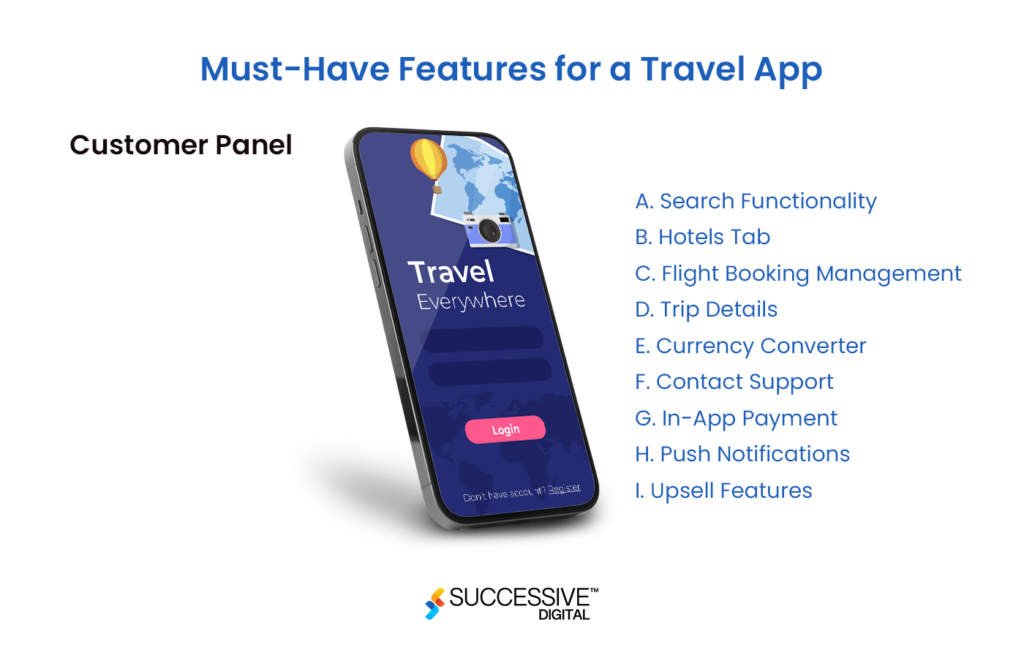
Travel App Development Features for Customer Panel
Being one of the core panels of a tourism app, it’s essential to add these features below to offer travelers a remarkable customer experience and engage them until and beyond the final purchase.
1. Log In/ Sign Up
Login and signup is a must-have feature in every mobile app, including the travel app. It allows users to easily register themselves on the business and save personal details like name, email address, phone number, home address, and other personal choices and preferences, which is further used to personalize the experience on the platform.
2. Search Functionality
Enabling a search functionality within a travel app requires you to pay enough attention and effort. As your travel app functions as a complete search engine for travel queries like destination information, flight or hotel bookings, or others, a search button at the top engages the user quickly by allowing them to search information instantly from your application. It enhances user experience within the app, reduces frustration, and increases satisfaction for every user.
3. Hotels Search
As accommodation is a crucial aspect of a trip, enabling a full-fledged hotel search option within an app allows you to address the vast preferences of the travelers, such as budget, location, amenities, and star ratings. You can also enable functionality like a filter for more deep searches at hotel levels; for example, a customer prefers an accommodation option at a particular property offering amenities like geyser and laundry service, breakfast availability, welcome drinks, and other add. The rule here is to be as descriptive as possible – enough to leave no room for confusion.
4. Flight Booking
A flight booking feature within a travel app allows customers to get real-time flight details for the searched destination on preferred dates, including flight availability, seating details, one-way or roundtrip details, etc. The rule that the travel app development company will implement here is to make this feature as intuitive as possible for travelers. For example, displaying fare rules and baggage information and providing functionalities such as sorting & filtering information by various options: departure time, trip time, layover duration, refundable fares, etc., make the user stick to the app and avail convenience at each step of travel planning.
5. Trip Details
A feature like “Trip details” or “my booking” as a separate section lets your customers view their trip history and upcoming trip details, such as booked flight tickets and accommodations. This feature would help them keep a reference point for their trip booking history, cancellations, and payments made, which they might consider revisiting in the future.
6. Currency Converter
If your app enables customers to travel worldwide, a currency converter is a must-have feature for the app. However, ensure it adequately displays currency conversion rates in real-time, such as Dollars ($) and Pounds (£) and others.
7. Contact Support
A key factor to focus upon while travel application development is ensuring you are available to your end users when they need you. Even if you cannot be physically present in the communication modes, you can integrate an AI-enabled chatbot to answer customers’ trip-related queries. The AI chatbot will provide them with personalized recommendations and solutions to enhance their trip-booking experience.
8. In-App Payment
One of the must-have features to add to your tourism app is in-app payment. You must integrate multiple payment gateways, such as Paypal, Stripe, and GooglePay, in your travel booking app to allow users to make payments against their booking from their preferred digital payment app without a hustle.
9. Push Notifications
Push notifications are significant and unavoidable when it comes to keeping the user engaged with your brand. With this feature, you can notify customers when a hotel is available for their preferred location, dates, and prices. Since customers continuously look for new offers or promotions, push notification encourages them to grab the deal instantly and make bookings too.
10. Additional Features
Though not essential, these are a few “good add-on features” to make your travel app more intuitive and efficient before your target audience. These include:
- Bundle Deals: Give customers details in combinations – Flight + Hotel or Hotel + Car deals to streamline their itinerary further.
- Car booking feature to make commutation easy in a foreign land.
- The “Things to Do” tab gives customers insight into activities happening at the destination on their trip dates.
Travel App Development Features for Admin Panel
The admin panel is the one where the admin is responsible for managing customers’ and agent’s details and streamlining the experience for both parties. The must-have features in this panel of the travel mobile application are discussed below.
1. User Management
User management is essential to maintain customer data, such as booking details, payment transactions, cancellation or refund information, and management of the overall profile of the user. The feature will help them streamline the process of keeping every booking running smoothly.
2. Agents Management
The Agents management feature is required to maintain the data of all third-party property owners and agents simultaneously. This includes details of the property and package and verification of property owners and agents.
3. Advertisement Management
It’s important for the app to display relevant advertisements, and it has to be managed by the admin. The admin will ensure the ads are travel-related, adhere to the parent company’s guidelines, and don’t overplay their role, which can lead to higher bounce-back numbers.
Travel App Development Features for Agent’s Panel
When we talk about agents, it means the hotels or trip planners who would be extending their services to your application. Here is the list of essential app features the agent panel of the travel app must include.
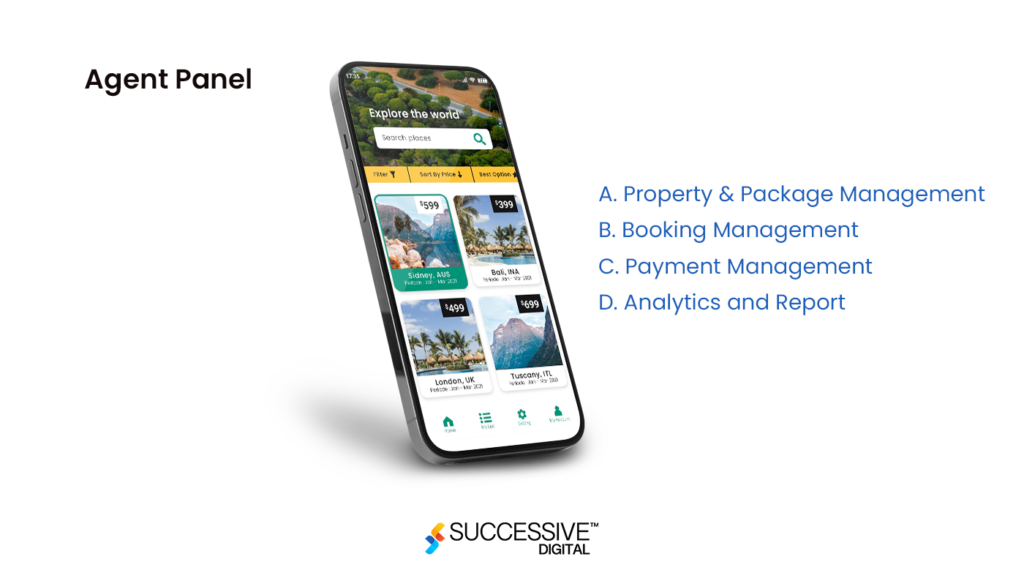
1. Property and Package Management
It is one of the most required features in the agent panel as it allows property managers or trip package owners to manage and modify the offering – the date, room availability, number of guests, payment details, etc.
2. Booking Management
The booking feature allows managers to decide whether they wish to accept or decline the booking request–in terms of requests aligning with the hotel’s policy or additional requests regarding smoking/non-smoking rooms and extra beds, etc.
3. Payment Management
Managing payments of several customers simultaneously is important for hospitality businesses to streamline transactions, refunds, and taxes. This feature is added to offer the service of accepting payments or making refunds, in addition to keeping track of the invoice of the bookings made.
4. Analytics and Reporting
The analytics and reporting feature will give hotel managers a dashboard to see the insights on their property or package, such as the number of bookings, reviews over time, payment details, etc. This will help them make better decisions about the property and the service they offer to the target travelers.
What is the Travel App Development Process?
Every successful tourism app, be it Expedia, Booking.com, or Airbnb, has followed a strategic app development process to make its product launch successful in the market. This is why a professional mobile app development company like Successive Digital suggests that businesses follow a dedicated step-by-step process, as explained below.
1. Market Research and App Ideation
The app development process begins with conducting in-depth research on the tourism industry, including the prevailing competition, market trends, and gaps that require a solution you can provide. This stage is highly crucial and the base determinant of whether the app will succeed in the market. During your research, you must also study your target audience and ideate the type of tourism app you want to build.
2. Decide App Features
After researching the market and identifying the target audience, the next step is to decide the features you want to add to your app. Do you want to make a basic features app? Or do you want a highly complex app with custom features and functionalities? This completely depends on your specific requirements, target users’ needs, and mostly your budget.
3. Consult and Hire a Trusted Travel App Development Company
Once you determine the app features and app type, it’s time to proceed with the development process. Building a mobile app in-house can cost you a fortune and requires deep knowledge of tech stacks. Hence, outsourcing a professional travel and tourism app development company is the best solution. The company will provide a dedicated development team ( frontend and backend developers, UI/UX designers, a project manager, a Business Analyst, a QA engineer, DevOps engineers, and a team lead.) They will understand your requirements and incorporate tech stacks and rightful development methods (native or cross-platform) to build a success-driven app product for your business.
4. MVP Development
Developing a minimum viable product (MVP) is an optimal strategy if you want to make your travel mobile app a success in the long run. An MVP is a basic feature version of the product, built with the aim of attaining feedback from a group of real users and then facilitating improvements in the app before the final launch. This will help create hype and awareness of your brand amongst the target users right from the initial stage and increase the chances of its success.
5. App Testing and Quality Assurance
After developing the MVP and making improvements as per user feedback, the app is pushed further for testing and quality assurance. The QA engineers will conduct thorough app testing, security compliance, and quality standardization to ensure your application is free of bug issues and glitches, can stand the competition, and is ready for the final launch amongst the end users.
6. Final Launch and Maintenance of the App
Now, every test, every quality check, and all other development phases are cleared, and your tourism app can be pushed to launch in the dedicated application stores (App Store and Google Play Store). Once it’s launched, the travel app development company will initiate maintenance efforts to streamline its functionality, fix bugs (if any), iterate improvements and updates, and maintain its performance.
Tech Stack Required for Travel App Development
In the process of travel mobile app development, you must also understand the tech stack used to build a full-fledged product. To develop a successful application like Booking.com or Airbnb, here is the probable list of tech stacks the development company will use.
| Development Use Case | Tech Stack |
| Backend | Python/Node.js/PHP |
| Frontend | Swift/ Java & Kotlin/ HTML, CSS, JavaScript/React Native, or Flutter |
| UI/UX Design | UIKit or SwiftUI for iOS, Android UI or Jetpack Compose for Android, Figma for cross-platform apps |
| DevOps | Chef, AWS CloudFormation |
| Cloud Server | Amazon AWS, Azure, Google |
| Database | MongoDB, Postgresql |
| Payment Integration | Paypal, GooglePay |
| Maps Integration | Google Maps API |
| Push Notification Integration | Pusher or OneSignal |
Travel App Development Cost
Like every other mobile application, various influencing factors determine the travel app development cost. However, the overall cost can range from $60,000 to $300,000 on average. The actual estimate depends on the type of app you want to build, the complexity of the features, technology integrations, and the location of the mobile app development company.
Nevertheless, the table below will provide a brief overview of cost estimation based on the app’s complexity:
| App Complexity | Development Cost | Timeframe |
| Basic app with essential features | $60,000- $150,000 | 3-5 months |
| Moderate app with complex features and native platform support | $150,000- $300,000 | 4-9 months |
| Highly complex app with complex design and cross-platform support | $150,000- $300,000 | 9+ months |
Wondering How Much Travel App Development Costs?
Book a free consultation with our experts and get your personalized quote today!
Why Successive Digital is a Reliable Partner for Travel App Development
With a decade of experience in facilitating digital transformation journeys of various industry-leading online travel agencies and hospitality businesses, Successive Digital takes pride in bridging the gap between technical complexities and innovation. Our seasoned developers will work closely with you to understand your pain points and create a tailored solution that appeals to your target audience. Our team has a strong understanding of robust frameworks and the latest technologies that can make your travel app a huge success.
Conclusion
With liberations in travel regulations and more people looking to explore their dream destinations, travel mobile app development is lucrative for online travel agencies more than ever. Since travelers now prefer online booking of their travel itinerary via smartphones, investing in travel app development can help you meet their needs faster and accelerate your business growth. However, to build a success-driven app, you must partner with a professional mobile app development company that can build a custom solution and integrate it with robust technologies.
FAQs- Travel App Development
Yes, investing in travel app development can turn out to be a successful move for your OTA. It will help you reach more customers, boost sales, and become a market leader in the long run.
The average travel and tourism app development cost can range between $60,000 to $300,000. But these are just rough figures, and the actual cost will vary depending on factors such as the type of app, the features’ complexity, development time, and the location of the mobile app development company.
Successive Digital has years of experience in developing custom travel apps for top-tier businesses in the tourism and hospitality sector. We understand each client’s specific needs and build a custom solution driven by innovation.
There are various types of travel app options available from which you can build the one that best aligns with your customers’ specific travel-related needs. These include:
- Travel planning app
- Ticket booking app
- Hotel booking app
- Travel insurance app
- Navigation app
- Travel guide app
- Transportation app









